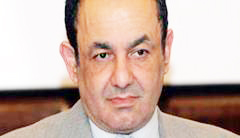Although the Assiut incident that left 52 children dead occurred several days ago, many columnists are still transfixed by the tragedy, its consequences and which institution is most to blame.
The spilled blood is the president’s responsibility
Mohamed Essmat
Al-Shorouk newspaper

It is unfair to put the full blame on the former Minister of Transportation Mohamed Rashad Al-Mateeny for the Assiut incident, writes Essmat. The primary responsibility for the children’s death should fall first on President Mohamed Morsy, and then on his Prime Minister Hesham Qandil.
The columnist objects to the ministry’s consideration of a new train project in cooperation with Japanese companies instead of implementing an urgent plan to restore roads in disrepair and atrocious public transportation.
Essmat asks how a minister could effectively consider the needs of the poor when even the president himself was unable to achieve any of his renaissance project’s goals or meet his first 100 days in office promises? According to the columnist, the working style of Al-Mateeny is reminiscent of the Mubarak era.
Nothing has changed since Morsy took power, and probably nothing would have changed either if Ahmed Shafiq had won the presidential election. The main issue is not Morsy, Qandil or even the minister, but rather, in Essmat’s opinon, “fake Islamists” who have been playing at politics in the name of Islam. Those 52 children who were innocently killed are the victims of a chaotic environment created by Shari’a brokers with a set of cosmetic beards, Essmat concludes
Blood on abandoned tracks
Amr Al-Shobaki
Al-Masry Al-Youm newspaper

Al-Shobaki believes that the primary cause of the Assiut train tragedy is the Muslim Brotherhood’s failure to convey a direct message to state institutions that their main objective is to achieve real development in Egypt.
All communication between the Muslim brotherhood and the country’s institutions has implied nothing but a desire for revenge against the old regime. The writer criticises the Muslim Brotherhood’s tone, which always creates further polarisation while dealing with institutions.
Without a doubt the president and his cabinet are always the first to be blamed for any issue, but the new government cannot be expected to repair a broken system in just six months, argues Al-Shobaki. He explains that most accidental deaths in Egypt are caused by failing transport infrastructure.
According to the writer, there are about 15,000 road deaths annually. Unfortunately, the children’s deaths are the responsibility of all Egyptians, who failed to contribute to any progress in the country, writes Al-Shobaki.



